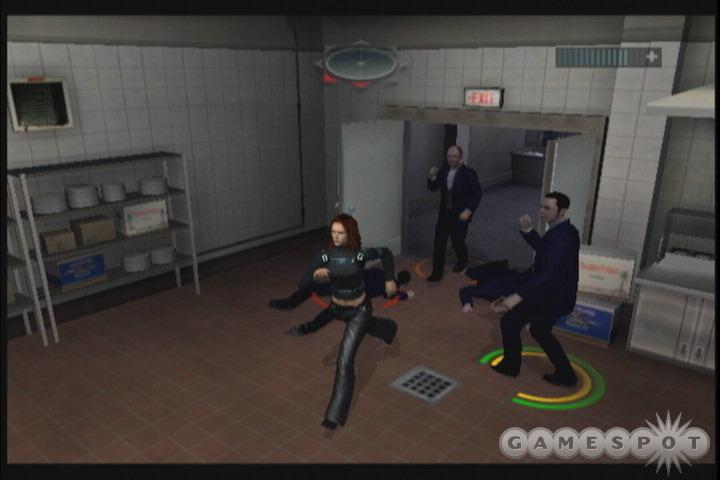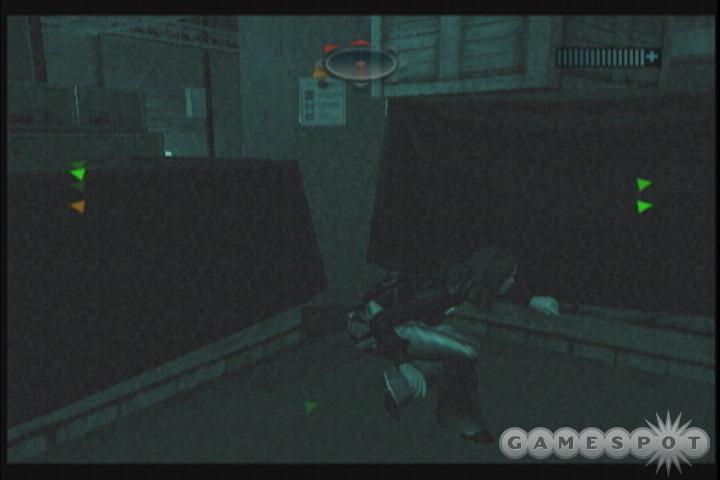When it comes to games based on popular movie or TV licenses, there is an exceedingly fine line between making a game that your typical gaming audience can appreciate and making a game a casual fan of your chosen license will be able to grasp. All too often, developers will simply abandon any sort of challenge or interesting gameplay mechanics in order to make these games more accessible to the casual audience, and usually, the end result is a product so dumbed down that it borders on unplayable. For Acclaim's licensing of ABC's hit TV series Alias, the developers have made somewhat of an effort to walk the line a bit closer to the middle, drawing upon tried-and-true stealth action conventions while still making the game easily playable to those unfamiliar with the genre. In the few instances where Alias is successful in this regard, it actually works quite well. Unfortunately, there are still too many unpolished areas and simply not enough challenge to make the game appealing to anyone outside of the most devout Alias audience.

Fans of the Alias show will likely recognize the game's plot as fitting in toward the end of the second season. In the game, you play exclusively as the show's oft-disguised heroine, Sydney Bristow. The plot has Sydney and her CIA cohorts hot on the trail of another Rambaldi artifact, which several of her archnemeses--including the likes of Arvin Sloane, Anna Espinosa, and Mr. Sark--are also on the hunt for. If none of these characters sound at all familiar to you, and you don't know what a Rambaldi artifact is, you might as well just stop reading right now, because Alias is most definitely not for you. The game's plot, while fairly intriguing and at times entertaining, is completely inaccessible to anyone who hasn't been watching the show from at least the beginning of the second season.
All of the show's primary protagonists make an appearance in the game, such as Jack Bristow, Sydney's father; Michael Vaughn, Sydney's frequent partner and occasional love interest; and Marshall Flinkman, the perpetually uncomfortable tech geek. For the most part, Sydney's associates only pop up in radio communication form during a mission and spout off bits of information to you as you reach certain objectives. While their information is always useful, these characters are actually chatty to a fault and pretty much take any of the guesswork out of the plot and mission structure. You can barely go five minutes in the game without getting some sort of snippet of information, leaving you with very little to figure out on your own.
Alias is, at its core, a simplistic take on the stealth action genre. As you make your way through the game's levels, you can toggle on and off a specific stealth mode that allows Sydney to creep along at a slower, more methodical pace. You can also crouch to duck behind objects, as well as press yourself up against a wall and peer around corners. When in stealth mode, you also have the option of performing stealth attacks on enemies. For instance, sneaking up behind an unwitting foe and pressing the stealth kill button performs a unique move, depending on the enemy and what kind of weapon you happen to be holding at the time. There isn't an especially wide variety of these moves, but they're cool nonetheless.
The trouble is that the game's artificial intelligence is all over the place in terms of how well you can actually sneak past them. Sometimes you can be standing 20 feet away in a brightly lit room with an enemy staring straight at you, and he'll simply walk off on his merry way. Other times, you'll be crouched while in stealth mode, hiding in the black shadows of a dark room, and suddenly three enemies will be on you nearly instantly. Certain other stealth mechanics, like climbing along pipes and such, just don't seem to work at all, period. Of course, all of this would only really matter if stealth were actually necessary to complete any objectives, which, as it happens, it isn't. Alias is an immensely easier game when you just throw stealth by the wayside and run-and-gun it the whole way through. Sounding off alarms only alerts the moderate number of guards that happen to be occupying that specific room, so, while you'll be dealing with more enemies at once, it ultimately saves you time. Sure, your propensity toward dying increases when playing with this method, but only by a small margin.
Why is it so easy to simply blaze past Alias' enemies? Aside from the fact that Sydney's health automatically replenishes itself for some unknown reason, it is mostly because the game's enemies are just plain dimwitted and can barely put up a fight to save their own lives. Enemies don't really attack you so much as they'll run in for one strike, then kind of wander around aimlessly, backing off as you run at them. Even if they're carrying semiautomatic weaponry, they'll just fire off a few short bursts, then start backing off as you charge at them with a broom handle or an equally less-threatening weapon. The only real challenge with the game's combat is trying to control Sydney's moves, which is a near impossibility. Whether you're pressing the "weak" or "strong" attack buttons, you never quite know what you're going to get, which makes trying to keep Sydney under control and attacking the right enemy rather tough, to say the least. Every move of Sydney's seems to be completely random, save for a few context-sensitive attacks, such as a wicked-looking clothesline and a rather brutal head smash. These only occur when she's near certain objects, however, and even then, they're still fairly fluky in nature.
Much like in the TV show, the missions in Alias are often centered on collecting or using high-tech gadgetry. As you go, you'll scan fingerprints, scan DNA, hack computers, and blow up security systems with laser beams, and, of course, as in any self-respecting stealth action game, you'll pick locks. While the game does provide you with a nicely varied array of fun trinkets to play around with, the puzzles and objectives associated with these tools are idiotically simple. When picking locks, all you are presented with are a series of latches within the lock. Simply press the control stick in the direction of the highlighted latch, press a button, repeat through each latch, and you're done. It's just that simple. As for the computer-hacking puzzles, all you have to do at any given time is guess the correct order of letters between A and D to solve a passcode. Sometimes there will be a time limit to this, but whenever you put a letter in a correct slot, it will tell you that you have guessed one or two correctly. It's such a ridiculously easy process of elimination that no one should have any trouble with it, even with only 30 seconds to do it. A couple of puzzles here and there do present a modicum of challenge, but nothing substantial enough to give the game's missions any real level of depth.
From a presentational standpoint, Alias does an adequate job of re-creating the visual style of the show, albeit with modest technology. The game itself looks as if it's loosely modeled after last year's Buffy The Vampire Slayer: Chaos Bleeds, both from stylistic and technical perspectives. The in-game character models are decent enough, though Sydney doesn't really resemble Jennifer Garner all that much, and most of the grunt enemies are repetitively designed. Most of the animation is fluid and decently put together, save for a few specific animations that just don't look good at all (like Sydney's running animation, which is the dumbest-looking running animation this side of Enter the Matrix). Environments are equally OK, in that they're all fairly pleasant to look at, though they're not without their problems; there are a few key lighting problems, as well as some rather obvious instances of texture seams showing through. Alias also features a healthy dose of CG cutscenes, which is where the majority of the side characters make their most substantial appearances. These characters look good, but the facial mapping and animation appear a little strange. Both the PS2 and Xbox versions of the game aren't without a few glitches and enemy clipping problems here and there, but the PS2 version also suffers from an occasionally erratic frame rate that tends to chop up at random intervals. Fortunately, the Xbox version seems to be devoid of this problem.

As has been the trend as of late, Alias features nearly the entire main cast of the TV show providing voice talent for their respective characters. On the whole, the actors manage to carry over their roles into a voice-acting capacity quite well, though there are some occasional dead reads of certain lines that seem more the fault of whoever was directing the recording session than the actors or actresses themselves. The only major complaint revolves around Kevin Weisman's Marshall Flinkman character, which, inexplicably, is given significantly more lines and more to do here than he tends to get on the show. Weisman's voice acting isn't exactly bad so much as it is just extremely overwrought. The character's neurotic nature is funny in small doses, but there's just so much of him in the game that it can't help but become irritating. The soundtrack features the typical theme music and score from the TV show, as well as a couple of fight sequences where you can brawl while enjoying a popular licensed song playing in the background. There aren't any standout sound effects, but what the game does provide is mostly good. The only irritation here is the enemy dialogue, which consists, quite literally, of roughly three voice samples that appear over and over and over again, ad nauseam.
Alias is a game that certainly could have turned out much worse than it did, but ultimately, it isn't nearly as appealing a product as one could have hoped. The core concepts found within the game are of a proven ilk, but the devil's in the details, as they say, and the sloppy execution of said concepts can't keep the game enjoyable for very long. If you are a big fan of the TV series, then perhaps Alias might be worth renting simply to experience the story. However, a purchase is not recommended for pretty much anyone, fan or not, as Alias just isn't good enough to warrant it.